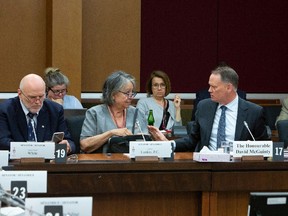Parliamentary oversight committee asks the government to respond to published reviews that highlight 'critical issues in the security and intelligence community'

OTTAWA – A parliamentary committee that oversees Canada’s intelligence service wants the Trudeau government to address a “long-standing challenge” and finally respond to all the “critical issues” it has found in the country’s security and spy services.
Has the federal government created an all-of-government plan to fight the significant” thread of foreign interference by hostile states?
Sign up to receive the daily top stories from the National Post, a division of Postmedia Network Inc.
Thanks for signing up!
A welcome email is on its way. If you don't see it, please check your junk folder.
The next issue of NP Posted will soon be in your inbox.
Or has it created a clear guide to circumscribe the Canadian Armed Forces’ ability to collect, use and retain information on Canadians during intelligence operations abroad?
The National Security and Intelligence Committee of Parliamentarians (NSICOP) would love to know, and it’s frustrated by the government’s lack of answers.
The call-out by the secretive but influential committee is contained in its 2021 annual report made public on Thursday.
Formed in 2017, NSICOP’s role is to provide parliamentary oversight to the 17 federal agencies involved in intelligence activities and operations, such as the Communications Security Establishment (CSE), Canadian Security Intelligence Service (CSIS) and the Royal Canadian Mounted Police (RCMP).
Since it was created, the committee has published eight special reviews or reports, each containing multiple recommendations for the government to improve its intelligence activities and better protect Canadians rights and data.
But the committee has long been frustrated by the government’s silence vis-à-vis its recommendations every time a review was published. It wasn’t until its eighth review published in 2021, a special report on government cyber defences, that the federal government actually responded with commitments to change.
-

Federal court throws out lawsuit of Ontario illegal pot farmer who sued CRA for $10M
-

Trudeau names new ambassador to China who will face 'headwinds' in frosty relationship, say experts
The report found that many federal organizations refused to obtain crucial cyber defence services from their own security and IT agencies at a time when government organizations are the target of unprecedented levels of cyber threats, namely from China and Russia.
“This year, the Committee was pleased to note the partial resolution of a long-standing challenge. For the first time, the government provided the Committee with a formal response to the recommendations included in one of its reports,” the committee wrote in its annual report.
“The Committee believes that responses to its recommendations are essential to strengthening the operations and accountability of security and intelligence organizations. It welcomes the government’s commitment, which it has cited as an area for improvement in past annual reports,” it continues.
But a response to a single review isn’t enough, the committee said. NSICOP, chaired by Liberal MP David McGuinty, wants the government to go back and respond to its seven other published reviews that highlight “critical issues in the security and intelligence community.”
Their report pointed out two reviews that it believes require a response and commitments from the government.
The first was a 2020 report on the “collection, use, retention and dissemination of information on Canadians” during intelligence activities conducted by the Canadian Armed Forces and the Department of National Defence.
The review namely found that DND held the “unjustifiable” belief that the Canadian Privacy Act does not apply to its operations abroad and that the framework the DND and the CAF use to guide the collection, use, retention and dissemination of information on Canadians “needs clarification.”
The second was a 2019 review that pointed out the “absence of a whole of government strategy” to deal with the growing threat of foreign interference in Canada.
“Some foreign states conduct sophisticated and pervasive foreign interference activities against Canada. Those activities pose a significant risk to national security,” read the review.
It concluded found that the country’s ability to address the threat was “limited” by the government’s lack of a “holistic approach” to assessing and responding to interference activities by hostile foreign states.
It also recommended the government develop a comprehensive strategy “to counter foreign interference and build institutional and public resiliency”. NSICOP also provided a series of suggestions as to what the plan should contain.
But has the government done that? NSICOP would love to know.
In the absence of a commitment from the government to respond to its many recommendations, NSICOP said it would begin its own review and tracking of progress made (if any) by departments included in its previous reports.
“In the coming year, the Committee will engage with organizations implicated in the Committee’s earlier reviews to determine whether they accept the Committee’s recommendations and what actions have been taken to respond to them,” reads the report.
In a statement, PMO spokesperson Cecely Roy said that the prime minister ordered in 2021 that the government must reply to NSICOP reports “going forward.”
The statement did not address responses to the previous seven reviews as requested by NSICOP.


